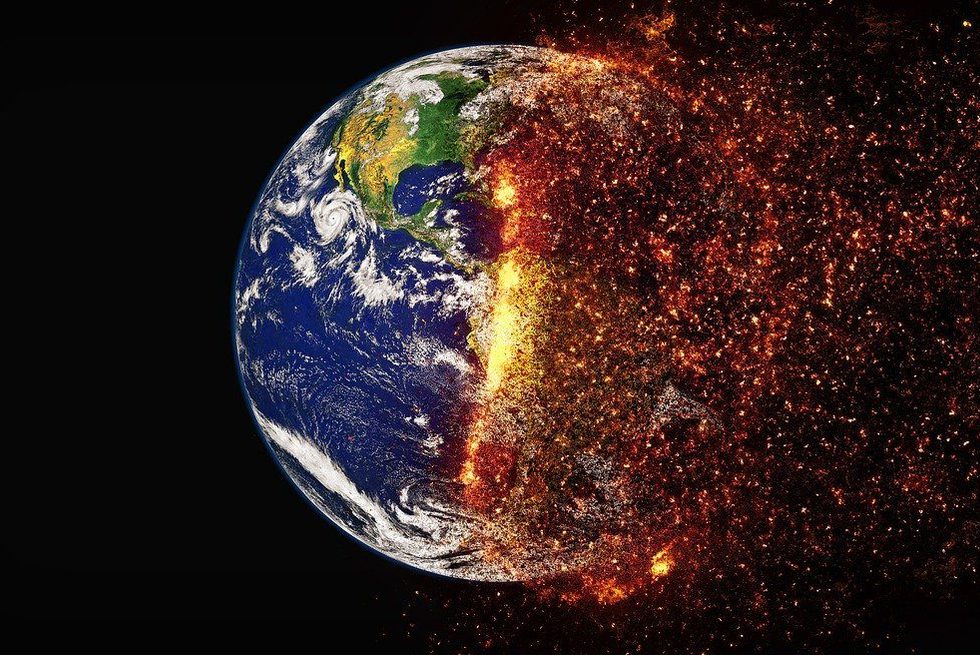
This is less a blog post than a virtual and distributed happening. We bring you the account of a roundtable at the November 2019 AAA/CASCA Annual Meeting in Vancouver, Canada. We also bring you the roundtable itself. Participants recorded their presentations in advance, and you’ll find all of them below. These videos will stream in the Vancouver Convention Centre. Discussion there will also stream here. We open the event to those who cannot afford to attend in person, and to those who feel the planet can no longer afford the megaconference model. We invite you to tune in and share your own thoughts, reactions, and questions, perhaps even your own testimonials, via #AnthroTwitter, via this hashtag, #ReimagineAAA. We call attention to the ethical and political stakes of conferencing, and novel collaborative experiments already afoot. Experiments, in fact, like this one.
The gravity of global climate change raises profound questions regarding the ordinary practices of carbon-intensive lifestyles. These are matters that concern our own academic habits as much as anything else in the world. Conference travel represents one of the most serious carbon footprints of an academic career. Gathering for a disciplinary megaconference in North America can produce as many carbon emissions over a few days as a human settlement of similar size may generate over an entire year in many countries of the global South. And these concerns compound other significant difficulties posed by the conventional physical conference: the steep cost of travel and accommodation, most especially for precariously placed academics here and abroad; hardships posed to those with physical disabilities; the challenge for parents and other caregivers juggling professional demands with responsibilities for kin. How do we wrestle as a profession with such implications, and what alternative forms of gathering and conversation may we devise?
This roundtable explores alternative models for the annual meeting and other professional conferences in anthropology. The roundtable brings together prominent anthropologists of climate change and ecological ethics, together with those who have devised alternative modes of conferencing in anthropology and reflected on their climatic, ethical, and access-related ramifications. Can such efforts generate strategies to reconfigure meetings like this AAA/CASCA gathering in Vancouver? Can virtual meetings meet the needs of scholars for face-to-face conversation and interaction? What hybrid forms may be devised to respond to such needs, while also reducing the carbon footprint of physical meetings? And can such efforts address concerns over precarity, disability, and other scholarly constraints on travel, side by side with climate?
“Reshaping the relationship between people and their carbon-intensive lifeways entails a shift in habitus,” the AAA Global Climate Change Task Force noted in 2014, recommending that the AAA “continue aggressively with developments in AAA that reduce the carbon footprint due to association-wide activities.” As far as we know, the AAA has not attempted a carbon footprint analysis of the annual meeting, but this ought to be a crucial site of action in the years ahead, as climate pressures continue to intensify. Other North American scholarly societies have taken such steps, like the American Academy of Religion’s idea of a society-wide “sabbatical” from their annual meeting, the Annual Meeting Climate Action Task Force recently established by the American Association of Geographers, or Distribute 2020, the nodally structured international biennial conference now being planned for next year by the Society for Cultural Anthropology and the Society for Visual Anthropology.
With the AAA/CASCA theme of “Changing Climates” in mind, this roundtable is an occasion for such reflection in anthropology, bringing the insights and practical experiences of the participants to bear on the basic modality of the physical conference and possible alternatives. This will necessarily be a collaborative effort: one that will indeed take struggle and negotiation, but hopefully for more just and equitable arrangements in the means by which we gather and converse. The roundtable begins with a series of critical reflections on the conventional conference model, followed by a discussion period. Presentations resume with a series of accounts of alternative possibilities, followed by discussion. All presentations will be available from 2:00 PM PDT on November 21, 2019 onward.
Please note: this online forum includes all presentations from roundtable participants as well as a few videos from anthropologists unable to participate in the Vancouver AAA/CASCA meeting for reasons of cost, geographic distance, immigration status, and carbon-related commitments. The choice to include them here was made in recognition of the exclusionary nature of the megaconference model, as well as the singular character of their potential contributions to this conversation. We hope that anthropology will continue to evolve alternatives for more genuinely inclusive discussion and exchange.
Assessing the Conventional Conference
“Disciplinary Desires, Systematic Benefits, and the Impossibility of Our Times” by Adam Fleischmann, McGill University
“Reciprocal Responsibilities to People and Place in the Ongoing Climate Crisis” by Zoe Todd, Carleton University
“The Borders that Bind Us: Navigating Systems as Non-US Citizens” by Argenis Hurtado Moreno, Oregon State University
“For Whom Is It Really Working?” by Emily Yates-Doerr, Oregon State University and the University of Amsterdam
“Flying Less: Some Reflections on Actions and Motivations” by Ben Orlove, Columbia University
“Decolonizing the Mega-Conference” by Ethiraj Gabriel Dattatreyan, Goldsmiths, University of London
“Meeting the Future, Anthropologically” by Eduardo Kohn, McGill University
Discussion
Roundtable Discussion 1 from SCA on Vimeo.
Emerging Alternatives
“Climate Change and Material Reflexivity: Some Reflections on a Year Without Flying” by Hannah Knox, University College London
“Lessons of #displace18” by Anand Pandian, Johns Hopkins University
“Climate Change and Academic Conferences: Experiences with Displacements ’18” by Jerome Whitington, New York University
“Enabling Access: An Art of Conviviality” by Tyler Zoanni, University of Bayreuth
“Making Anthropology Accessible” by Krista Billingsley and Taapsi Ramchandani
“Small Socialities” by Mayanthi Fernando, UC Santa Cruz
“On Democratic Affordances and Infrastructural Recombination” by Andrea Muehlebach, University of Toronto
Discussion
Roundtable Discussion 2 from SCA on Vimeo.